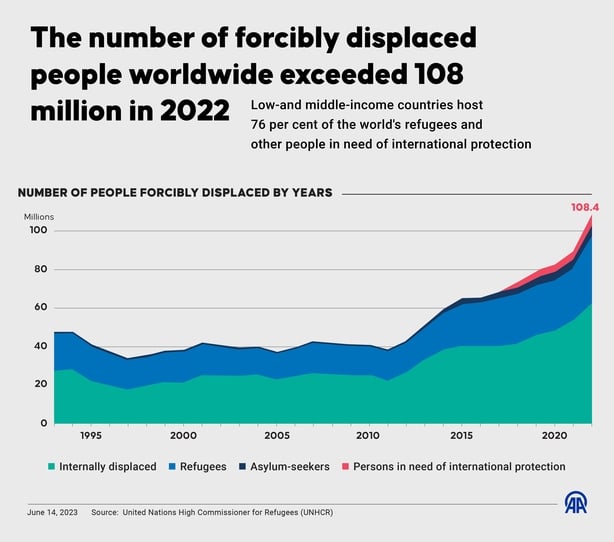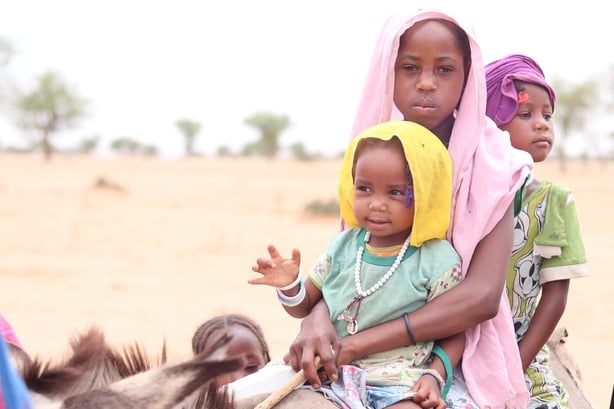The number of people forcibly displaced around the world has climbed to a record 110 million people, the head of the UN refugee agency (UNHCR) has said, with conflicts in Ukraine and Sudan spurring millions of people to flee their homes.
The increase of around 19 million people to 108.4 million by the end of last year is the biggest annual jump on record, UNHCR said in a report released today.
That number has since risen further to 110 million, mostly due to Sudan's eight-week-old conflict, the UN High Commissioner for Refugees Filippo Grandi told journalists.
"It's quite an indictment on the state of our world to have to report that," he said at a Geneva press conference.
"Solutions to these movements are increasingly difficult to even imagine, to even put on the table.
"We are in a very polarised world, where international tensions play out all the way into humanitarian issues."
For the two decades before the Syria conflict in 2011, the global level was roughly stable at about 40 million refugees and internally displaced people, the Forced Displacement report showed.
But they have risen each year since and have now more than doubled. More than one in every 74 people is now displaced, the report said.

Read more: Record number of internally displaced people due to war, climate change
Mr Grandi blamed "the usual package of causes" which he said were conflict, persecution, discrimination, violence and climate change.
Of the total refugees and those needing international protection, about half of them came from just three countries:Syria, Ukraine and Afghanistan.
Mr Grandi raised concerns about tougher rules on admitting refugees and push-backs.
"We see increasingly a reluctance on the part of states to fully adhere to the principles of the (1951 refugee) convention, even states that have signed it," Mr Grandi told Reuters on the sidelines of the briefing.
However, he was upbeat about some developments, namely a deal reached by EU ministers last week on sharing responsibility for migrants and refugees.
"There are issues of some concern. By and large however, I think it's a positive step," he said. "We're so happy that the Europeans agree on something."
He also praised Kenya which he said is looking for new solutions for the half million refugees it hosts, including many who have fled poverty and drought in the Horn of Africa.
Numbers likely to increase
Of the 2022 global total, 35.3 million were refugees who fled abroad, with 62.5 million being internally displaced.
There were 5.4 million asylum-seekers and a further 5.2 million other people - predominantly from Venezuela - needing international protection.
"My fear is that the figure is likely to increase more," said Mr Grandi.
He said the swelling displacement this year was being increasingly met with "a more hostile environment, especially when it comes to refugees, almost everywhere".
"Leadership is about convincing your public opinion that there are people that deserve international protection," he said.
The UN High Commissioner for Refugees noted that around 76% of refugees fled to low- and middle-income countries, while 70% stayed in neighbouring countries.

Door must 'remain open'
Mr Grandi said Britain's plans to send asylum-seekers to Rwanda for adjudication was "not a good idea".
He said the US case was more complex, but added: "We are worried... about denial of access to asylum in the United States".
Under tougher new US rules, asylum-seekers are supposed to set up an interview appointment through a smartphone application or processing centres Washington plans in Colombia, Guatemala and other countries.
Sudan fears
Mr Grandi pleaded for urgent global action to alleviate the causes and impact of displacement, saying UNHCR was "not in a good financial situation this year".
UNHCR's internal Sudan crisis appeal is only 16% funded, and the appeal for the refugee-hosting countries is 13% funded.
Some 467,000 people have fled Sudan since fighting between warring parties broke out in mid-April, while more than 1.4 million have become internally displaced.
Of the planning figure of a million refugees fleeing Sudan in six months, he said: "Now I'm thinking it's too little."
There were 6.5 million Syrian refugees at the end of 2022, of which 3.5 million are in neighbouring Turkey.
There were 5.7 million Ukrainian refugees, with the February 2022 Russian invasion triggering the fastest outflow of refugees since World War II.
Last year, over 339,000 refugees returned to 38 countries, while 5.7 million internally displaced people returned home.
The countries hosting the most refugees are Turkey (3.6 million), Iran (3.4 million), Colombia (2.5 million), Germany (2.1 million) and Pakistan (1.7 million).

